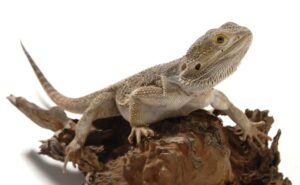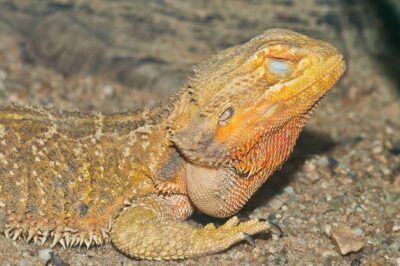If you’ve ever observed your bearded dragon closing one eye and wondered what it could signify, you’re not alone. Bearded dragons are fascinating creatures, and their behaviors often prompt curiosity and concern among their owners.
When a bearded dragon closes one eye, it can be a signal of various underlying issues or natural behaviors. From environmental factors to health concerns, understanding why your bearded dragon might be closing one eye is essential for ensuring their well-being.
In this article, we’ll explore the common reasons behind this behavior and what steps you can take to address it.
Understanding Bearded Dragon Behavior

Understanding bearded dragon behavior involves observing their physical actions, body language, and interactions with their environment. Here are some key aspects:
1. Body Language
- Head Bobbing: This can indicate dominance or territorial behavior. Males often bob their heads to establish dominance, while younger dragons might do it in response to excitement or when they see their reflection.
- Arm Waving: This is usually a submissive gesture. Bearded dragons wave their arms to show that they are not a threat and to communicate submission to a dominant dragon.
- Black Beard: A bearded dragon’s beard may darken and puff up when they are threatened, stressed, or trying to assert dominance. It can also happen during mating displays.
2. Activity Levels
- Brumation: This is a period of reduced activity similar to hibernation. It usually occurs in cooler months and involves decreased appetite and energy levels.
- Basking: Bearded dragons bask under a heat source to regulate their body temperature. They need UVB light for proper calcium metabolism, so a basking spot with appropriate lighting is essential.
3. Feeding Behavior
- Hunting: Bearded dragons are insectivores and will actively hunt moving prey. They may exhibit a “hunting” stance where they puff out their beard and watch their prey closely.
- Eating Patterns: They can show preferences for certain types of food and might be more interested in live prey compared to vegetables.
4. Interactions with Humans
- Socialization: Many bearded dragons enjoy interaction with their owners. They might become more active or curious when people are around, and some may even seek out human contact.
- Handling: Regular, gentle handling can help a bearded dragon become more accustomed to being held. It’s important to support their body fully and avoid sudden movements.
5. Environmental Factors
- Habitat Changes: Changes in their environment, such as new decorations or different lighting, can affect their behavior. Bearded dragons are sensitive to their surroundings, so a stable environment is key.
Understanding these behaviors can help in providing proper care and ensuring that your bearded dragon is healthy and happy. If you notice any unusual behavior or health issues, it’s always a good idea to consult a veterinarian experienced with reptiles.
Common Causes of a Bearded Dragon Closing One Eye
When a bearded dragon closes one eye, it can be a sign of several potential issues. Here are common causes:
1. Injury or Trauma
- Physical Injury: An injury to the eye from rough handling, a scratch, or an accident can cause discomfort and lead to the eye being closed.
- Foreign Objects: Debris or substrate getting into the eye can cause irritation, leading the dragon to close it.
2. Eye Infection or Illness
- Bacterial Infection: Infections can cause swelling, redness, and discharge, making the eye painful and leading to it being closed.
- Viral or Fungal Infections: Less common but possible, infections from viruses or fungi can also affect the eyes.
- Conjunctivitis: Inflammation of the lining of the eye, often due to infection or irritation, can make the eye appear swollen and lead to it being closed.
3. Parasites
- External Parasites: Mites or other parasites can infest the eye area, causing irritation and discomfort.
- Internal Parasites: These can sometimes lead to systemic issues that affect the eyes indirectly.
4. Environmental Factors
- Improper Lighting: Incorrect UVB lighting or too much direct light can cause eye strain or discomfort.
- Temperature Extremes: Unusual temperature changes in the habitat can stress the bearded dragon, potentially leading to eye issues.
5. Nutritional Deficiencies
- Vitamin A Deficiency: A lack of vitamin A can lead to eye problems, including closing of one eye. Vitamin A is crucial for maintaining healthy eyes and skin.
6. Dehydration
- Dry Environment: A lack of humidity can cause the eyes to dry out, leading to irritation and the dragon closing one eye.
7. Behavioral Reasons
- Resting or Sleeping: Sometimes, a bearded dragon might close one eye while resting or sleeping, especially if it’s feeling secure and relaxed.
8. Stress or Illness
- General Stress: Stress from changes in the environment, handling, or other factors can cause eye-related issues.
- Systemic Illnesses: Conditions affecting overall health can sometimes manifest as eye problems, though this is less common.
If a bearded dragon persistently closes one eye or shows other signs of distress, it’s important to consult a veterinarian experienced with reptiles to diagnose and treat the issue accurately.
How to Diagnose the Problem

Diagnosing the cause of a bearded dragon closing one eye involves a combination of observing symptoms, assessing environmental factors, and sometimes seeking veterinary help. Here’s a step-by-step approach:
1. Observe and Document Symptoms
- Check for Other Symptoms: Note if there are any additional signs such as redness, swelling, discharge, or changes in behavior.
- Monitor Behavior: Observe if the bearded dragon is eating and drinking normally, and whether there’s any change in activity levels.
2. Inspect the Eye
- Examine for Foreign Objects: Look carefully for any debris, foreign particles, or signs of injury. Gently check the eye area for scratches or cuts.
- Assess Discharge: Determine if there is any discharge (clear, cloudy, or colored), which can indicate infection or irritation.
- Check for Swelling: Swelling around the eye can point to an infection or injury.
3. Evaluate Environmental Conditions
- Lighting and UVB: Ensure that the UVB light is functioning correctly and that the bearded dragon has access to appropriate lighting. Incorrect lighting can cause eye issues.
- Temperature and Humidity: Verify that the temperature and humidity levels in the enclosure are within the recommended range. Extremes can stress the bearded dragon and affect its health.
4. Assess Diet
- Check Nutritional Intake: Review the diet to ensure it includes sufficient vitamin A, calcium, and other essential nutrients. Nutritional deficiencies can impact eye health.
- Evaluate Hydration: Make sure the bearded dragon is drinking enough water and that the habitat has adequate humidity to prevent dehydration.
5. Inspect for Parasites
- Look for External Parasites: Examine the bearded dragon for signs of mites or other parasites around the eye and body.
- Consider Internal Parasites: If other symptoms are present, such as changes in feces or weight loss, internal parasites might be a concern.
6. Behavioral Observation
- Resting vs. Illness: Determine if the closed eye could simply be due to the bearded dragon resting or sleeping, especially if other symptoms are absent.
7. Consult a Veterinarian
- Seek Professional Help: If the problem persists, worsens, or if you’re unsure about the cause, consult a veterinarian experienced with reptiles. They can perform a thorough examination and may recommend treatments such as medications, eye drops, or changes in the environment.
8. Medical Tests (If Needed)
- Eye Swab or Culture: For infections, the vet might take a sample to identify the specific cause.
- Blood Tests: These can help diagnose systemic issues or nutritional deficiencies.
Timely diagnosis and treatment are crucial for maintaining your bearded dragon’s health and well-being. If you’re ever in doubt, seeking veterinary advice is always a prudent step.
Treatment and Prevention
If your bearded dragon is closing one eye, it could be a sign of various issues, ranging from minor irritations to more serious health concerns. Here are some potential causes and treatments:
1. Eye Infection or Irritation
- Symptoms: Swelling, redness, discharge.
- Treatment: Gently clean the eye with a saline solution (make sure it’s safe for reptiles) and apply an ophthalmic ointment designed for reptiles. Consult a vet for a proper diagnosis and treatment plan.
2. Foreign Object
- Symptoms: Squinting, rubbing the eye.
- Treatment: Check the eye for any visible foreign objects. If you find something, gently remove it using a soft, clean tool. If it’s not visible or you’re unsure, a vet visit is recommended.
3. Respiratory Infections
- Symptoms: Eye swelling, mucus, lethargy.
- Treatment: Increase humidity and ensure proper temperature in the habitat. Consult a vet for specific treatments, which may include antibiotics or other medications.
4. MBD (Metabolic Bone Disease)
- Symptoms: Soft or deformed bones, lethargy, eye issues.
- Treatment: Provide proper UVB lighting and calcium supplements. A vet can provide specific treatments and advice based on the severity.
5. Dehydration
- Symptoms: Dry, sunken eyes.
- Treatment: Ensure your bearded dragon is drinking enough water. You can offer water through a shallow dish or by misting the enclosure. Consider using a reptile hydration supplement if necessary.
6. Injury
- Symptoms: Swelling, bruising.
- Treatment: Examine for signs of trauma. Provide a clean and stress-free environment. Seek veterinary care if you suspect a serious injury.
General Tips
- Keep the Habitat Clean: Maintain proper hygiene to prevent infections.
- Monitor Temperature and Humidity: Ensure the enclosure is set to the correct temperature and humidity levels.
Always consult a vet who specializes in reptiles for an accurate diagnosis and treatment plan tailored to your bearded dragon’s specific needs.
Conclusion
If you notice your bearded dragon closing one eye, it’s important to pay close attention as it could indicate various underlying issues, from minor irritations to more serious health concerns. Potential causes include eye infections, foreign objects, respiratory infections, or even dehydration.
Ensuring a clean habitat, proper lighting, and appropriate hydration can help prevent some issues, but it’s crucial to consult a vet for an accurate diagnosis and tailored treatment. Addressing the problem promptly will help ensure your bearded dragon’s well-being and comfort.

